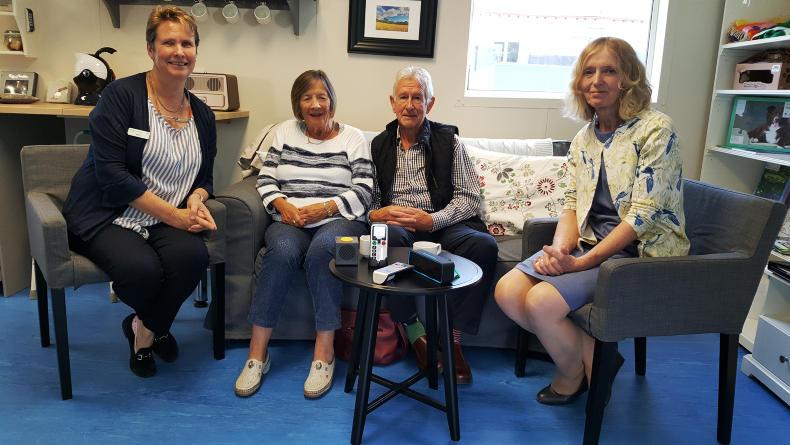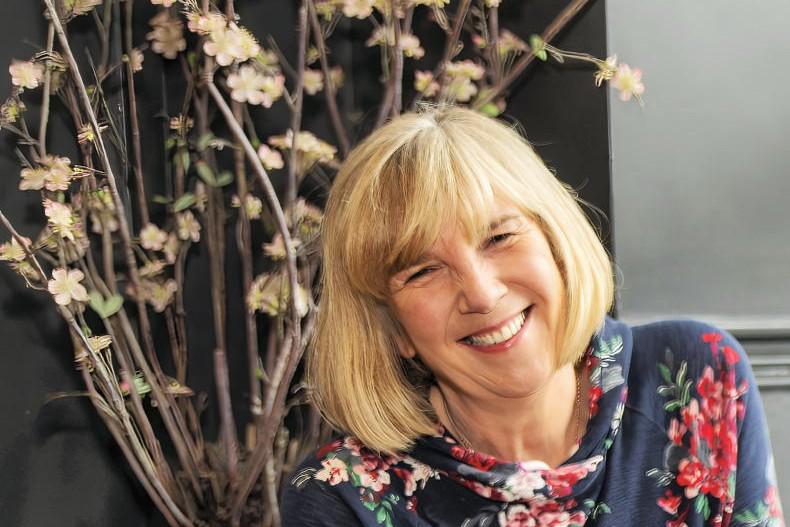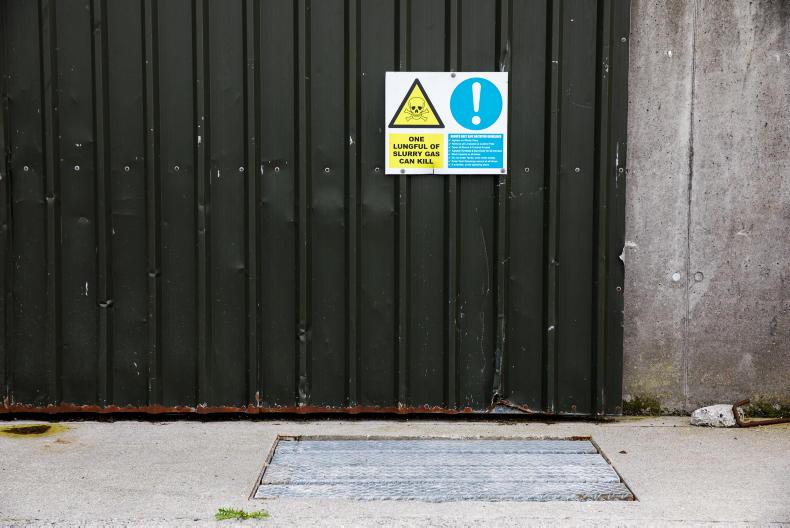It was like stepping into an apartment – kitchen table, sofa, coffee table, cupboards – and not a hospital uniform in sight. That’s because this new building in the grounds of St Columcille’s hospital in Loughlinstown, Co Dublin, that showcases high-tech and low-tech devices that help with independent living, also wants to put users at ease.
Senior occupational therapist Joyce Jones deliberately doesn’t wear her health professional’s uniform.
“We want a homely atmosphere where people with dementia and family can feel comfortable and relaxed when they come for advice,” she says.
She is delighted that this room – and similar ones across the country – are now up and running. In the past she was only able to show patients and families equipment that would be of use in catalogues in a clinical setting.
“Looking at something in a catalogue in a clinic isn’t as good as having someone demonstrate the technology in a place like this. We’ve found that there is now much more of a take-up of the advice we offer.”
Memory resource libraries like this – free to those who have had a dementia or brain injury diagnosis – have been possible because of Dormant Account funding.
Already a senior occupational therapist working in the hospital, Joyce got the two-day-a-week post because of her dementia champion qualification (funded by Atlantic Philanthropies). She had also been a discharge planner – something that fed her eagerness to improve the system.
“If someone was admitted with a stroke or chest infection and dementia was in the picture, it really made a big difference to their discharge plans,” she says.
“With pressure to free up beds, I felt that people weren’t being given enough time to talk about the dementia aspect, but there was nothing we could do about it at that time. That was the system. Yes, grab rails and seating at a proper height could be installed at home but the person mightn’t be able to use them. Medication was also a huge problem – it might not be taken or else taken twice.”
Joyce went on to set up memory rehab support groups following her champion training and was very aware of a GENIO-funded dementia project in Clonmel where a memory library had already been set up.
“We thought it was fabulous and that we could do that too, so we had this building in the grounds organised even before the HSE began rolling out its national memory room initiative.”
Empty shell – needed a ‘meitheal’
That wasn’t the whole story though. They had an empty shell – now they needed furniture and equipment.
“We did a lot of fundraising but the whole hospital was behind it. Friends of St Columncille’s helped and IKEA gave money and help too.”
Everything was flat-packed, so it meant an all-hands-on-deck Saturday to put everything together.
“It was very exciting,” she says, “seeing the kitchen come together.”
Funding to staff only came through in 2016, however, and this memory room finally opened in March 2018.
“We held an open day for GPs in Wicklow, talks for doctors in the hospital, as well as public health nurses and community occupational therapists.
“A lot of referrals come that way obviously, but people or a family member can self-refer once they have a diagnosis.”
What really frustrates you?
Joyce’s first question to those she helps is to ask what the biggest frustration is for them.
“I get answers like: ‘I forget what day it is.’ Or: ‘I forget when I’m going to the hairdresser so I ask over and over.’ Patients’ first two questions to her are: ‘Can you fix my memory and will I get worse very quickly?’
“I tell them I can’t fix their memory,” she says, “and that not even doctors can say at what rate they will get worse, but what I do say is: ‘You’re here now and we can start putting things in place that will help you manage for longer.’”
It’s about finding strategies to help you compensate for memory weaknesses, she says.
“I don’t do assessments here as they are already done but I may do a few cognitive tests so that I can figure out what items of equipment would be most helpful for them.”
Easy-to-use items
The equipment is displayed on the kitchen counters. There are easy-to-use mobile phones and landline phones with photos of family members on them to make calls easy. There are noticeboards aplenty and all sorts of clocks that have the date as well as time on them and a yellow button that says, ‘mum, have you turned off the cooker?’ if you obey the ‘push’ instruction on it.
There are mobile phones with a locator facility also.
“It’s not a tracker and is with the person’s permission. If someone has gone for a walk, a family member can go onto a website and locate them.”
There are reminder signs of all sorts, a radio that can be covered so that the tuning can’t be changed by those with later-stage dementia who might be inclined to fiddle with the knobs, and, of course, easy-to-use remote controls for TVs.
Talking photo album
There is a reminiscence gem also in the form of a talking photo album.
“Family members record details of each photograph and the person with dementia presses a button and can hear a loved one talk about the day the photo was taken. It’s a wonderful gift because your long-term memory and emotional memory stays intact for a long time.”
Equipment is not free, however, and buyers are advised to shop around from the given list of suppliers. Gadgets don’t have to be high-tech to be valuable, of course. A whiteboard that is written up with plans for the week can be very useful.
“It just helps put order on someone’s mind. One man who uses it says it’s his friend because it reassures him. Eventually technology – high- or low-tech – won’t replace a person being there, of course, but it will help for a while.”
Twenty-three rooms by the end of the year.
Anna De Siún is a senior project manager with the National Dementia Office and is delighted that the national rollout of the memory resource rooms is happening. Seventeen rooms are already open and there will be 23 by the end of the year.
“As Joyce said, it has been based on the Clonmel assistive technology library model. We’re working for early diagnosis for dementia also as that’s really important and why we’ve launched the ‘Understanding Together’ campaign to help reduce the stigma that is associated with dementia. It’s the stigma that stops people seeking a diagnosis. A recent survey has shown that 25% of people delay getting a diagnosis.”
She says that dementia can be difficult to diagnose.
“That’s because there are so many different types. It can take time as other causes have to be ruled out. It’s a process. We’re working on improving the diagnostic services in Ireland and the memory rooms are already playing a really important part in the post-diagnostic support.”
For more information, see www.understandtogether.ie. St Columcille’s Resource Room can be contacted at 01-2115186.

(L-r) Occupational therapist Joyce Jones with service-users Kallie and her husband, Tony, along with Jacinta whose mother has Alzheimer’s.
Tony, whose wife Kallie has dementia for the past three years, speaks highly of the help they’ve had here:
“It’s a relaxing place for us to visit and good to look at what’s available to help you. You get ideas and you can adapt them to suit your own situation.”
Tony uses laminated sheets of yellow paper with the days of the week written on them popped into an empty picture frame to remind Kallie what day it is.
“Signs that have black text on yellow paper are often easier for those with dementia to read,” he says.
You become resourceful trying to solve problems, Tony says.
“A digital clock didn’t work for her and the second hand on our ordinary clock was distracting her so I broke the second hand off – perfect!”
Tony also had found a portable speaker that is useful.
“Kallie loves music and sings along and dances to it but it was difficult for her to use CDs so I found a chargeable speaker that she can carry around everywhere with her that will play from a usb stick.”
A big fan of country and western, she smiles when we mention music.
“I really love it,” she says.
Tony likes the non-clinical environment of the memory room in St Columcille’s. “Kallie is relaxed and there are lots of ideas and time to look at stuff. Even two or three little things make a big difference.”
Jacinta has sought the help of the Resource Room for her mother (87) who has dementia and still lives on her own.
“It’s a tremendous resource, you get expert advice before you invest in something and the occupational therapists can help you fit the technology into your lifestyle.”
Jacinta’s family have purchased a clock and mobile phone for their mother.
“It’s a clock with the day on it as well as the time and we’ve put a pill box with the days of the week beside it too so we know that she has taken her tablets. The clock is very discreet and fits in with the kitchen. It’s important that it fits in with a home, that it’s not announcing that the person has major problems with memory.”
They hope the easy-to-use mobile phone will give them peace of mind too.
“Mum spends a lot of time in the garden so she doesn’t always answer the phone. We’re hoping she puts the mobile in her pocket. We’ll tell her it will be just one of us if it rings and to please answer it.”

Phones with photographs on buttons to help users make calls.
Finding a Memory Room
The national launch of the Memory Resource Rooms was on World Alzheimer Day, 21 September. To find a Memory Room near you go to http://www.understandtogether.ie/ To see a video filmed the day we visited this resource room featuring Tony, Kallie and Jacinta, see http://www.understandtogether.ie/training-resources/helpful-resources/memory-assistive-technologies/
It was like stepping into an apartment – kitchen table, sofa, coffee table, cupboards – and not a hospital uniform in sight. That’s because this new building in the grounds of St Columcille’s hospital in Loughlinstown, Co Dublin, that showcases high-tech and low-tech devices that help with independent living, also wants to put users at ease.
Senior occupational therapist Joyce Jones deliberately doesn’t wear her health professional’s uniform.
“We want a homely atmosphere where people with dementia and family can feel comfortable and relaxed when they come for advice,” she says.
She is delighted that this room – and similar ones across the country – are now up and running. In the past she was only able to show patients and families equipment that would be of use in catalogues in a clinical setting.
“Looking at something in a catalogue in a clinic isn’t as good as having someone demonstrate the technology in a place like this. We’ve found that there is now much more of a take-up of the advice we offer.”
Memory resource libraries like this – free to those who have had a dementia or brain injury diagnosis – have been possible because of Dormant Account funding.
Already a senior occupational therapist working in the hospital, Joyce got the two-day-a-week post because of her dementia champion qualification (funded by Atlantic Philanthropies). She had also been a discharge planner – something that fed her eagerness to improve the system.
“If someone was admitted with a stroke or chest infection and dementia was in the picture, it really made a big difference to their discharge plans,” she says.
“With pressure to free up beds, I felt that people weren’t being given enough time to talk about the dementia aspect, but there was nothing we could do about it at that time. That was the system. Yes, grab rails and seating at a proper height could be installed at home but the person mightn’t be able to use them. Medication was also a huge problem – it might not be taken or else taken twice.”
Joyce went on to set up memory rehab support groups following her champion training and was very aware of a GENIO-funded dementia project in Clonmel where a memory library had already been set up.
“We thought it was fabulous and that we could do that too, so we had this building in the grounds organised even before the HSE began rolling out its national memory room initiative.”
Empty shell – needed a ‘meitheal’
That wasn’t the whole story though. They had an empty shell – now they needed furniture and equipment.
“We did a lot of fundraising but the whole hospital was behind it. Friends of St Columncille’s helped and IKEA gave money and help too.”
Everything was flat-packed, so it meant an all-hands-on-deck Saturday to put everything together.
“It was very exciting,” she says, “seeing the kitchen come together.”
Funding to staff only came through in 2016, however, and this memory room finally opened in March 2018.
“We held an open day for GPs in Wicklow, talks for doctors in the hospital, as well as public health nurses and community occupational therapists.
“A lot of referrals come that way obviously, but people or a family member can self-refer once they have a diagnosis.”
What really frustrates you?
Joyce’s first question to those she helps is to ask what the biggest frustration is for them.
“I get answers like: ‘I forget what day it is.’ Or: ‘I forget when I’m going to the hairdresser so I ask over and over.’ Patients’ first two questions to her are: ‘Can you fix my memory and will I get worse very quickly?’
“I tell them I can’t fix their memory,” she says, “and that not even doctors can say at what rate they will get worse, but what I do say is: ‘You’re here now and we can start putting things in place that will help you manage for longer.’”
It’s about finding strategies to help you compensate for memory weaknesses, she says.
“I don’t do assessments here as they are already done but I may do a few cognitive tests so that I can figure out what items of equipment would be most helpful for them.”
Easy-to-use items
The equipment is displayed on the kitchen counters. There are easy-to-use mobile phones and landline phones with photos of family members on them to make calls easy. There are noticeboards aplenty and all sorts of clocks that have the date as well as time on them and a yellow button that says, ‘mum, have you turned off the cooker?’ if you obey the ‘push’ instruction on it.
There are mobile phones with a locator facility also.
“It’s not a tracker and is with the person’s permission. If someone has gone for a walk, a family member can go onto a website and locate them.”
There are reminder signs of all sorts, a radio that can be covered so that the tuning can’t be changed by those with later-stage dementia who might be inclined to fiddle with the knobs, and, of course, easy-to-use remote controls for TVs.
Talking photo album
There is a reminiscence gem also in the form of a talking photo album.
“Family members record details of each photograph and the person with dementia presses a button and can hear a loved one talk about the day the photo was taken. It’s a wonderful gift because your long-term memory and emotional memory stays intact for a long time.”
Equipment is not free, however, and buyers are advised to shop around from the given list of suppliers. Gadgets don’t have to be high-tech to be valuable, of course. A whiteboard that is written up with plans for the week can be very useful.
“It just helps put order on someone’s mind. One man who uses it says it’s his friend because it reassures him. Eventually technology – high- or low-tech – won’t replace a person being there, of course, but it will help for a while.”
Twenty-three rooms by the end of the year.
Anna De Siún is a senior project manager with the National Dementia Office and is delighted that the national rollout of the memory resource rooms is happening. Seventeen rooms are already open and there will be 23 by the end of the year.
“As Joyce said, it has been based on the Clonmel assistive technology library model. We’re working for early diagnosis for dementia also as that’s really important and why we’ve launched the ‘Understanding Together’ campaign to help reduce the stigma that is associated with dementia. It’s the stigma that stops people seeking a diagnosis. A recent survey has shown that 25% of people delay getting a diagnosis.”
She says that dementia can be difficult to diagnose.
“That’s because there are so many different types. It can take time as other causes have to be ruled out. It’s a process. We’re working on improving the diagnostic services in Ireland and the memory rooms are already playing a really important part in the post-diagnostic support.”
For more information, see www.understandtogether.ie. St Columcille’s Resource Room can be contacted at 01-2115186.

(L-r) Occupational therapist Joyce Jones with service-users Kallie and her husband, Tony, along with Jacinta whose mother has Alzheimer’s.
Tony, whose wife Kallie has dementia for the past three years, speaks highly of the help they’ve had here:
“It’s a relaxing place for us to visit and good to look at what’s available to help you. You get ideas and you can adapt them to suit your own situation.”
Tony uses laminated sheets of yellow paper with the days of the week written on them popped into an empty picture frame to remind Kallie what day it is.
“Signs that have black text on yellow paper are often easier for those with dementia to read,” he says.
You become resourceful trying to solve problems, Tony says.
“A digital clock didn’t work for her and the second hand on our ordinary clock was distracting her so I broke the second hand off – perfect!”
Tony also had found a portable speaker that is useful.
“Kallie loves music and sings along and dances to it but it was difficult for her to use CDs so I found a chargeable speaker that she can carry around everywhere with her that will play from a usb stick.”
A big fan of country and western, she smiles when we mention music.
“I really love it,” she says.
Tony likes the non-clinical environment of the memory room in St Columcille’s. “Kallie is relaxed and there are lots of ideas and time to look at stuff. Even two or three little things make a big difference.”
Jacinta has sought the help of the Resource Room for her mother (87) who has dementia and still lives on her own.
“It’s a tremendous resource, you get expert advice before you invest in something and the occupational therapists can help you fit the technology into your lifestyle.”
Jacinta’s family have purchased a clock and mobile phone for their mother.
“It’s a clock with the day on it as well as the time and we’ve put a pill box with the days of the week beside it too so we know that she has taken her tablets. The clock is very discreet and fits in with the kitchen. It’s important that it fits in with a home, that it’s not announcing that the person has major problems with memory.”
They hope the easy-to-use mobile phone will give them peace of mind too.
“Mum spends a lot of time in the garden so she doesn’t always answer the phone. We’re hoping she puts the mobile in her pocket. We’ll tell her it will be just one of us if it rings and to please answer it.”

Phones with photographs on buttons to help users make calls.
Finding a Memory Room
The national launch of the Memory Resource Rooms was on World Alzheimer Day, 21 September. To find a Memory Room near you go to http://www.understandtogether.ie/ To see a video filmed the day we visited this resource room featuring Tony, Kallie and Jacinta, see http://www.understandtogether.ie/training-resources/helpful-resources/memory-assistive-technologies/










SHARING OPTIONS